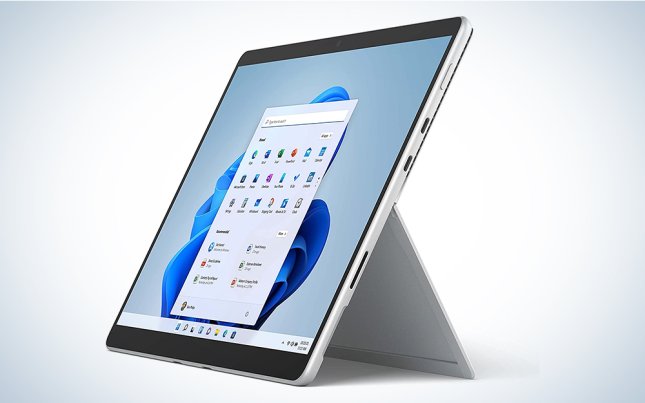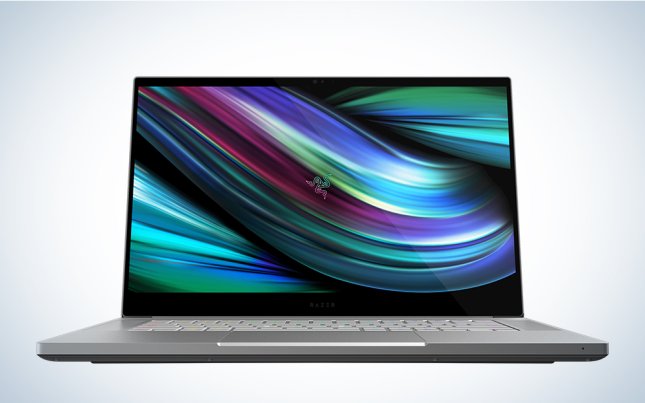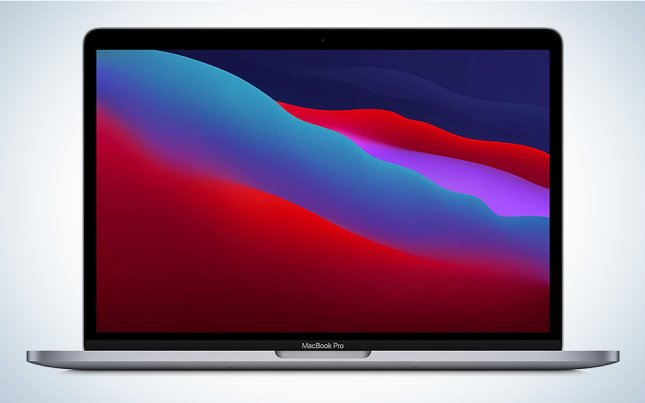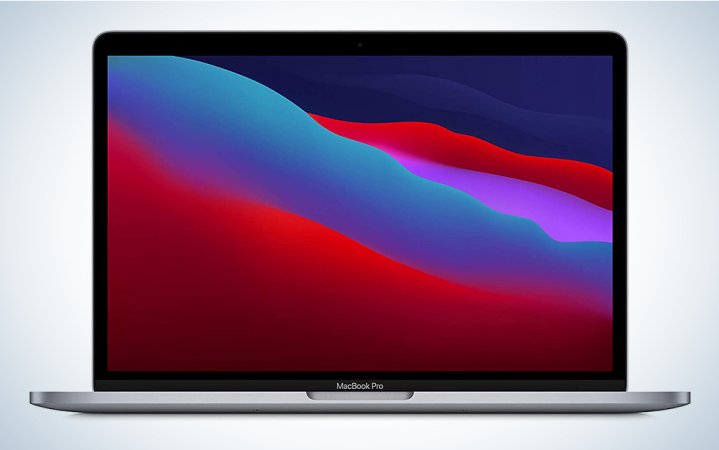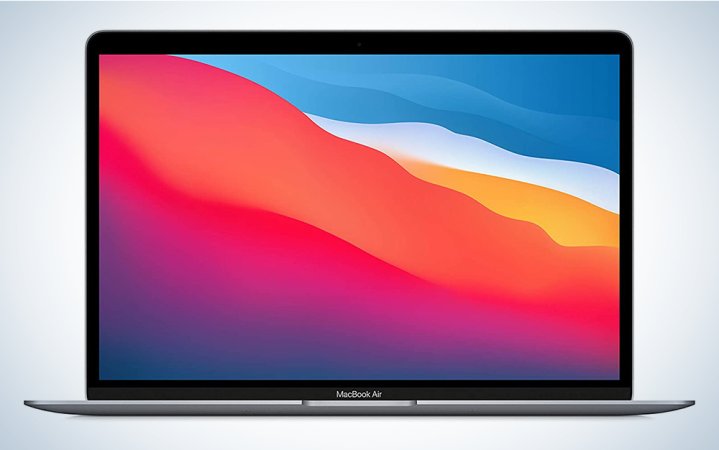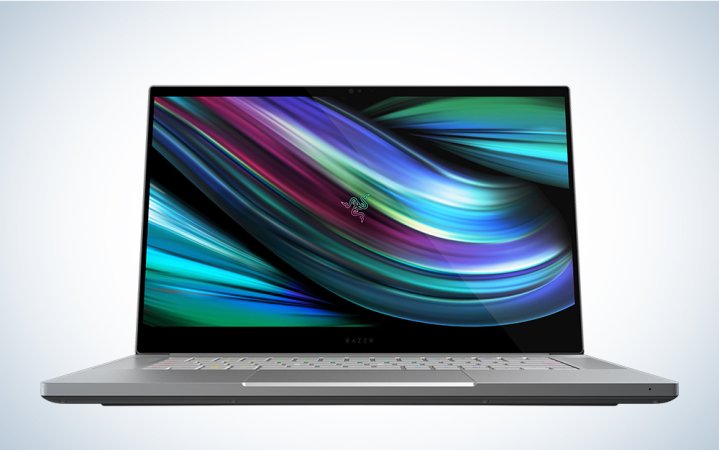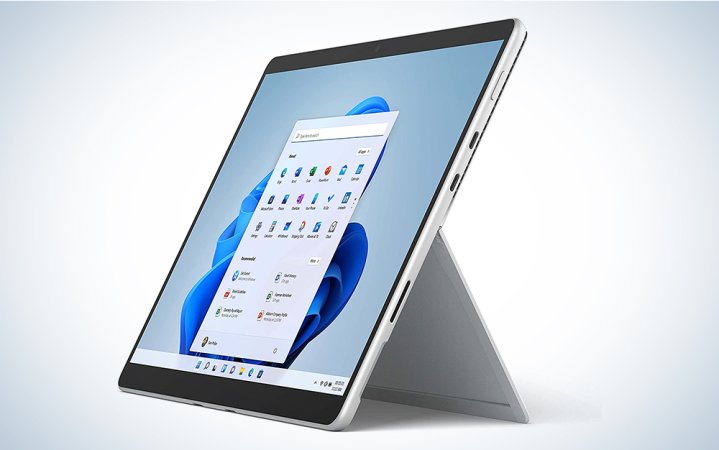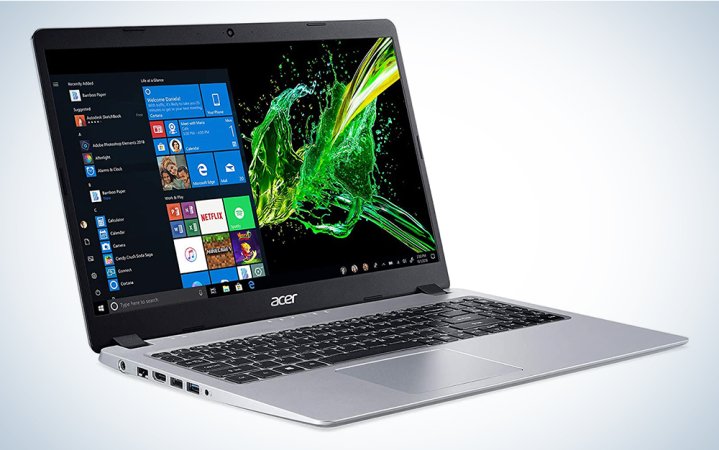We may earn revenue from the products available on this page and participate in affiliate programs. Learn more ›
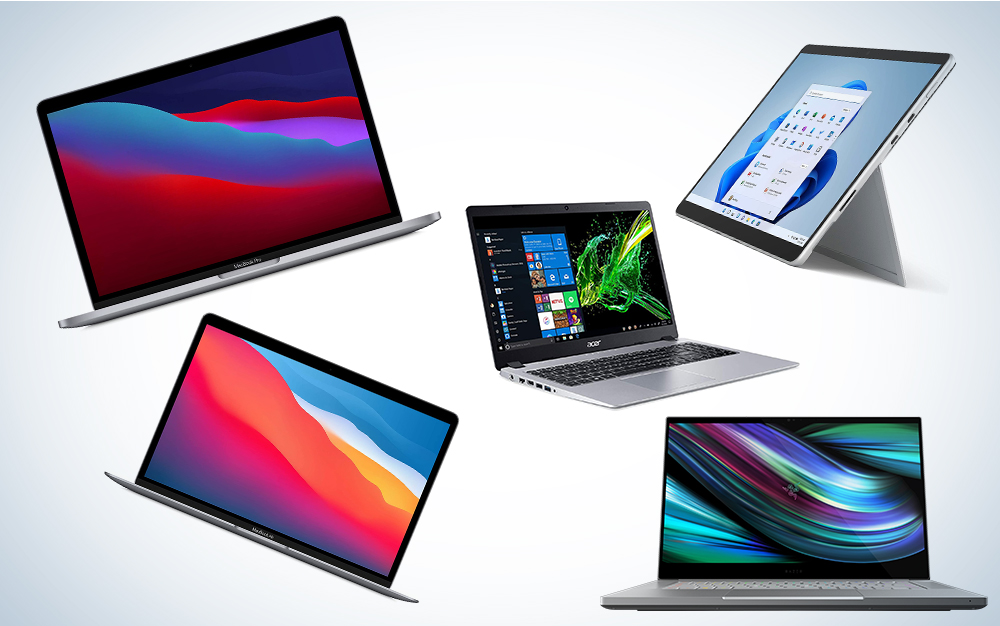
Laptops are a conspicuously close friend of flamboyant electronic music producers and DJs in studios and on stage, personalized with stickers and custom patches. But the truth is that portable computers can be just as vital a companion in recording settings for professional and amateur singer-songwriters, classical music arrangers, country crooners, etc. The best laptops for music production may traditionally be dominated by MacBooks, but they’re not the only option—welcome news for buyers on a budget who are intimidated by Apple’s high pay-to-play price tags. If you’ve got the urge to learn or hone existing digital DJing skills or to produce music of any flavor at any level, a laptop is one of the most important investments you can make, whether your aspirations are professional or not.
- Best laptop for production and DJing: Apple MacBook Pro 13-inch M1
- Best laptop under $1,000: Apple MacBook Air M1
- Best Windows laptop: Razer Blade 15 Studio Edition
- Best 2-in-1 laptop: Microsoft Surface Pro 8
- Best budget laptop: Acer Aspire 5
How we selected the best laptops for music production
In choosing the best laptops for music production, we focused on computers with fast processors and enough RAM and storage to handle audio work as quickly and efficiently as possible. The best digital audio workstations (DAWs) and music production software can be resource-hungry, so upgrade from the base model accordingly. We also considered the breadth and depth of potential users who might want to buy a computer to make songs. The guide includes recommendations for beginners with no musical experience who may not want to spend four figures to match a few beats and move on, tinkerers who will forever keep their own music private, semi-serious hobbyists who like to share their creations with the world on SoundCloud, Mixcloud, or social media, and professional musicians who need a lifeline of a machine that can stand up to rigorous use. Each laptop highlighted below would be an asset to anyone making music.
What to consider when shopping for the best laptops for music production
When shopping for the best laptops for music production, you should first consider your desired level and frequency of use for a laptop. Are you going to play around with sketching tunes for fun once in a while, or do you envision putting in some serious hours and sharing your work widely? There’s a good chance you may end up going deeper than you thought, so it’s not a bad idea to think about buying a laptop for music production that you can grow into over several years. That means maxing out the specs, if possible.
What is the CPU?
The central processing unit (or CPU for short) is the brain of any laptop, executing or delegating all the most important duties. Computer processing speed is key for music producers. You’ll want a fast processor to capture multiple sources, sculpt responses, render real-time effects, and minimize lag time. If your computer is too slow to process information, you can risk a musical idea flying out of your head while you’re waiting.
What is the RAM?
Random-access memory (or RAM for short) holds the information a computer needs, like the data in an application, in a short-term space so it can be swiftly accessible. When you’re looking for a laptop for music production, having a lot of RAM is important in order to power your software program, especially if you’re working with multitrack recordings.
What is the storage?
Storage here refers to the amount of permanent space your computer has for system software and programs (as well as the temporary swap space made available to get data in and out of memory). When you get close to running out of storage on a laptop, not only can you not save your takes, edits, etc., but performance problems ranging from processing lag to frequent crashing can quickly arise.
The best laptops for music production Reviews & Recommendations
Whether you’re building a dedicated production rig or want a multipurpose laptop you can use for Google Workspace and gaming as easily as you do arranging audio stems, these are our picks for some top platforms.
Best laptop for production and DJing: Apple MacBook Pro 13-inch M1
Best laptop for music production and DJing
Play On The (M)1
Pros
- 20-hour battery life
- High-bandwidth, low-latency architecture
- Hardware optimized operating system
Cons
- Not all recording software/hardware supports M1 yet
- Expensive
- Processor refresh imminent
Why it made the cut: Custom chips take the leader of the best laptops for music production and DJing pack from strength to strength.
Specs:
- CPU: System-on-a-Chip (SoC) Apple M1 chip; 8-core CPU with 4 performance cores and 4 efficiency cores; up to 8-core GPU; 16-core Neural Engine
- RAM: 8GB or 16GB memory
- Storage: 256GB, 512GB, 1T, or 2T SSD storage
- Battery life: Up to 20 hours of battery life
Apple reinvented the MacBook Pro series of laptops with its M1 chip, the proprietary processor that was first released in November 2020. The M1 replaces the Intel processors that have been used in MacBooks since 2006 with Apple’s own silicon (and an operating system optimized for it). You’ll see a majority of working DJs and performing producers basking in the glow of their MacBook’s 2560-by-1600, 227 pixels per inch screen, as the M1 series of processors is the company’s future in action. The fact these custom chips help contribute to battery life of up to 20 hours will be a lifesaver on the road and in the studio. Just remember to max out at purchase, as they aren’t user-serviceable, and you’ll definitely want 16GB of RAM and 2TB of storage if you’re carrying the best DJ software and/or best beat-making software, plus your entire library of tracks, clips, (re)mix sessions, etc. And the USB-C ports can support multiple external controllers/interfaces. And if you need to download new sounds on the fly, Wi-Fi 6 support and Thunderbolt/USB 4 are integrated. The ability to wake instantly and put its 16-core Neural Engine to work beat-matching and synth-patching makes the MacBook Pro an industry leader for a reason. A new MacBook Pro with a theoretical “M1X” processor is still rumored to be bringing more CPU and GPU (graphics processing unit) cores in the near future, which may be an important consideration for those who like to wait for the latest and greatest Apple MacBook Pro model before they make a big purchase. Everyone else can opt for this current version with no reservations.
Best laptop for under $1,000: Apple MacBook Air M1
on under $1,000
More Taste, Fewer Calories
Pros
- Least expensive MacBook
- Lightweight
- Fanless cooling
Cons
- Only 8GB RAM and 256GB SSD on the sub-$1,000 model
- No active cooling means a slightly throttled processor
Why it made the cut: Equipped with an M1 processor, the MacBook Air is a good start if you want to enter the Apple universe without going for a high-end Pro.
Specs:
- CPU: System-on-a-Chip (SoC) Apple M1 chip; 8-core CPU with 4 performance cores and 4 efficiency cores; up to 8-core GPU; 16-core Neural Engine
- RAM: 8GB or 16GB memory
- Storage: 256GB, 512GB, 1T, or 2T SSD storage
- Battery life: Up to 18 hours of battery life
The best laptops for music production can reliably be found at the MacBook Pro level, but those models can be quite expensive, especially if you max them out. If you’re not ready to make that size of an investment, which can easily go over $2,000, a MacBook Air is a more affordable way to get a taste of the Apple world of music-making. Both the Air and the Pro models are equipped with Apple’s own high-bandwidth, low-latency M1 processor-based architecture, which first came out in 2020. Their CPU and GPU are in line, but there are some key differences that can put a slight cap on how you operate. The baseline, under-$1,000 Air model has 8GB RAM (half the max memory of a Pro), plus only 256GB internal storage), which won’t allow you to run a major digital audio workstation (DAW) to maximum efficiency, though it will still operate just fine if you’re not looking to track massive ensemble sessions or route every channel through multiple instances of effects. Plus the included GarageBand software features virtual instruments, endless sample and loop packs, and other tools that offer a great starter pack to make your own songs and remixes. On top of all that, it’s got a vivid 13.3‑inch, 2560‑by‑1600-resolution Retina display (all the better for organizing those color-coded samples and channels). And the fanless operation is a boon when working around sensitive microphones.
Best Windows laptop: Razer Blade 15 Studio Edition
Best Windows laptop for music production
Game The Systems
Pros
- Scorching fast processor
- 15-inch 3840 x 2160 screen
- Slim, sleek aluminum case
Cons
- Expensive
- Heavier at 5 pounds
- Can get very hot, even with innovative liquid cooling
Why it made the cut: The Razer Blade 15 is our pick for the best Windows laptop for music production because of the powerful processing, memory, and storage that your musical opus needs.
Specs:
- CPU: 8-Core 10th Gen i7-10875H
- RAM: 16GB or 32GB memory
- Storage: 512GB or 1TB SSD storage
- Battery life: Up to 4.5 hours battery life
The best gaming laptops innately have powerful processors and lots of memory and storage, which makes the Razer Blade 15 Studio Edition’s 8-core 10th Gen i7 processor, 1TB of blazing-fast PCIe NVMe storage, and 32GB of DDR4-2933MHz RAM an incredibly solid choice for making music. If you are particularly ambitious with your composition and gaming pursuits, you can do sound design for games and play them on the same machine. You shouldn’t experience lags that can throw off your creative headspace thanks to premium features including processor speed up to 5.1GHz Max Turbo, Wi-Fi 6, Thunderbolt 3, an innovative liquid cooling system, a Chroma RGB keyboard, plus a gorgeous 4K OLED touchscreen—all within a slim anodized CNC Aluminum case. But these can certainly come at a high price. With a cost that hovers around either side of $4,000, depending on if sales are in effect, it is definitely a serious commitment that may scare off a lot of casual buyers. After all, MacBook laptops, typically considered expensive, can be had for less than half of the price of the Razer Blade 15 Studio Edition. However, if Macs aren’t the apple of your eye, this is a great pick—especially if you want to have the best for both competitive eSports and crafting EDM, (psycho)acoustics, etc.
Best 2-in-1 laptop: Microsoft Surface Pro 8
Best 2-in-1 laptop for music production
Wonder Twin Powers, Unite
Pros
- Less than 2 pounds
- Improved battery life
- Versatile
- 120Hz refresh rate
Cons
- Increased price
Why it made the cut: As the best 2 in 1 laptop for music production the Surface Pro 8 allows users to adapt how they sketch ideas, offering the versatility of a laptop and a tablet in under 2 pounds of power.
Specs:
- CPU: Intel Evo Platform Core i7
- RAM: 8GB, 16GB, or 32GB memory
- Storage: 128GB, 256GB, 512GB, or 1TB SSD storage
- Battery life: Up to 16 hours battery life
Many artists love to work with 2-in-1 laptops in order to have the option to be tactile on-the-go with a 13-inch, 2880 x 1920, 120Hz touchscreen, which can be valuable if you want to be able to literally sketch various ideas before you flesh them out. Just add the optional Surface Slim Pen 2 and/or detachable Signature Keyboard to get the most from this convertible. Built on the Intel Evo processor platform and running Windows 11, this extremely portable, full-featured machine means you can boot up whatever software you need whenever the melodies form in your brain. While integrated systems aren’t as powerful as those built with discrete components (nor are they upgradeable later), there’s more than enough packed into this machine for a solo artist/content creator to run podcasting software to Pro Tools. We named the laptop’s predecessor, the Microsoft Surface Pro 7, the best laptop for college, so this improved 2-in-1 laptop, which now has up to 16 hours of battery life as compared to 10.5 hours in that previous iteration, makes for a good academic and accounting tool if you’re balancing another career or continuing education with music. You can Excel as you excel, using Wi-Fi 6, plus USB-C and Thunderbolt 4 ports, to keep you in touch with managers, booking agents, and social media alongside mixers, control surfaces, and whatever else you need to enrich your signal channel. Though, as always, opt for the most specced out option you can afford and expect a few software hiccups when adopting the latest version of an operating system.
Best budget laptop: Acer Aspire 5
Best budget laptop for music production
A Three-Figure Workhorse
Pros
- Fast for the price
- Affordable
- Ample storage
Cons
- Short battery life
- Low base RAM
Why it made the cut: Save money and your ideas on this budget buy with enough storage space for whatever’s in your headspace.
Specs:
- CPU: AMD Ryzen 7 3700U Dual-Core Processor 2
- RAM: 4GB, 8GB, 12GB, or 16GB memory
- Storage: 128GB, 256GB, 512GB, or 1T SSD storage
- Battery life: Up to 7.5 hours battery life
The Acer Aspire is the best budget laptop for music production because it’s a fast, well-performing laptop that hits all the right, well, notes, all while saving you several. With an AMD Ryzen 7 dual-core processor operating up to 4.0 GHz, plus 8GB RAM and a 512GB PCIe NVMe SSD, this favorably priced favorite offers a lot for under $700. That price tag does come with some minor challenges, but they can be worked around pretty easily. For instance, five hours of battery life, which is the average for this model, will go by in a flash, so you’ll always want to make sure you’ve got your power cord tether with you on the road (even the 7.5-hour maximum can be no match for many producers when they find themselves deep in the groove). And the money you save can go toward even. more. gear!
FAQs
Any laptop (even computers for kids) can be used for some sort of music production, whether it’s just recording external and internal sounds or using a basic sequencer. Entire albums managed to be made 10, 20, 30, 40 years ago when laptops were nowhere near as powerful. Even entry-level MacBooks come preloaded with a software program called Apple GarageBand, which can be used for music production, while free software programs like Audacity can be downloaded by both Mac and Windows users to produce and edit music. If your laptop has a slow processor with low RAM and storage space, it might be a bit of a drawn-out and frustrating process if you’re trying to use the latest software, though, so you may need to work on smaller projects or opt for older versions of programs.
When assessing how much RAM you need for music production, it’s a good idea to take a look at the minimum requirements for popular software programs. Leading digital audio workstations (DAWs) and music production software (such as Ableton Live 11) work best with a minimum of 8GB of RAM, so while less powerful options may only require half of that, it should be considered the baseline for music production. More, however, has never hurt, so if it’s possible to have 16GB of RAM, have 16GB of RAM for optimal performance when making music.
The best laptops for music production are ready to be hammered with heavy use since they have a fast CPU, plus a lot of RAM and storage. Since digital music production is also a heavily visual craft, a large screen with high display resolution also helps to make a laptop good for music production. At the minimum, a laptop shouldn’t be cluttered with too many applications or too much media—if it’s full of files, don’t be surprised when hiccups and delays arise. And while USB-C ports have the versatility of supporting breakout boxes that offer access to multiple inputs and outputs (I/O), you’re going to want more than one to offer up ease of configuration and reduce theoretical bottlenecks.
The final word on the best laptops for music production
Ultimately, the most important tool when making music is your creativity. When that music is expressed digitally, however, you’ll want a laptop that helps you channel what’s in your head. Being a Mac or Windows user usually comes down to personal preference and powerful brand loyalty often developed over a lifetime, and both operating systems are supported by laptops with fast processors, lots of RAM, plentiful storage, and batteries that can perform well for the long, rabbit hole hours that producers of all levels tend to fall into when creating songs. And if you’re taking your show on the road, you want a durable machine with protective accessories that won’t let you down. The best laptops for music production are ready for wherever your sonic journey takes you.
